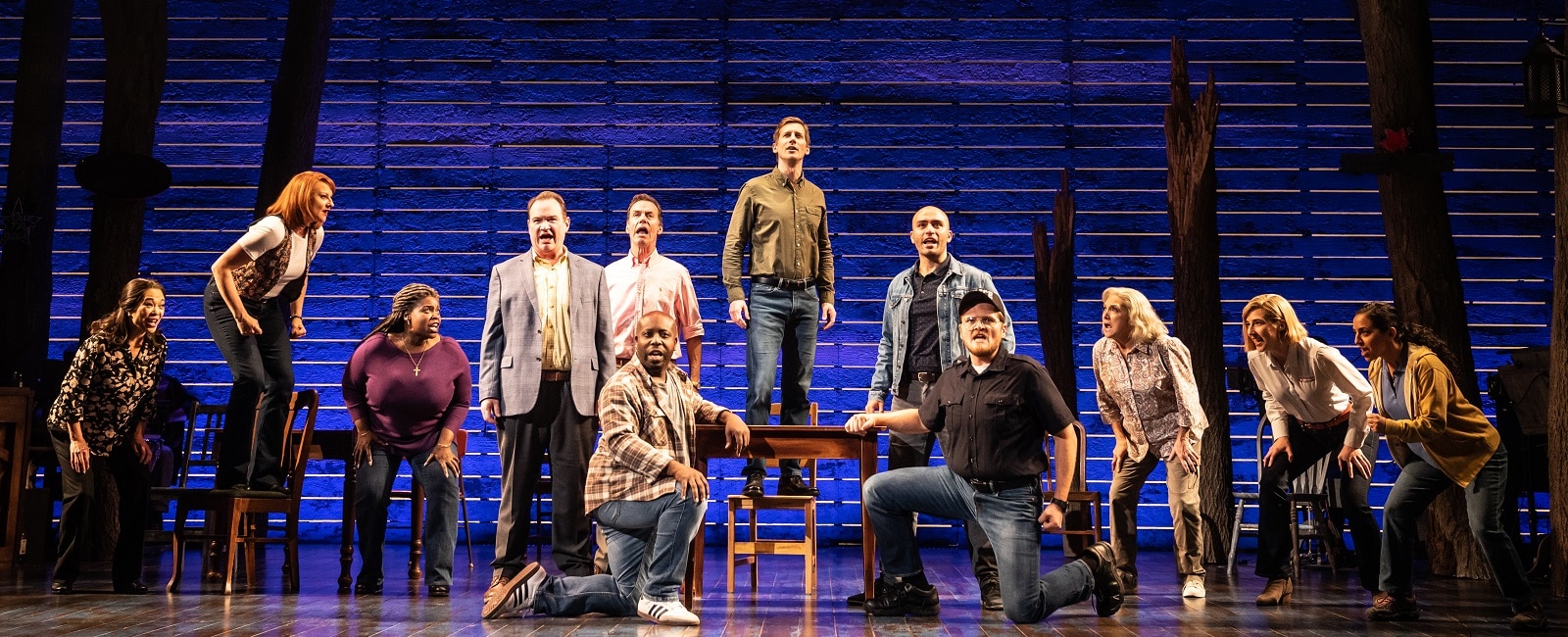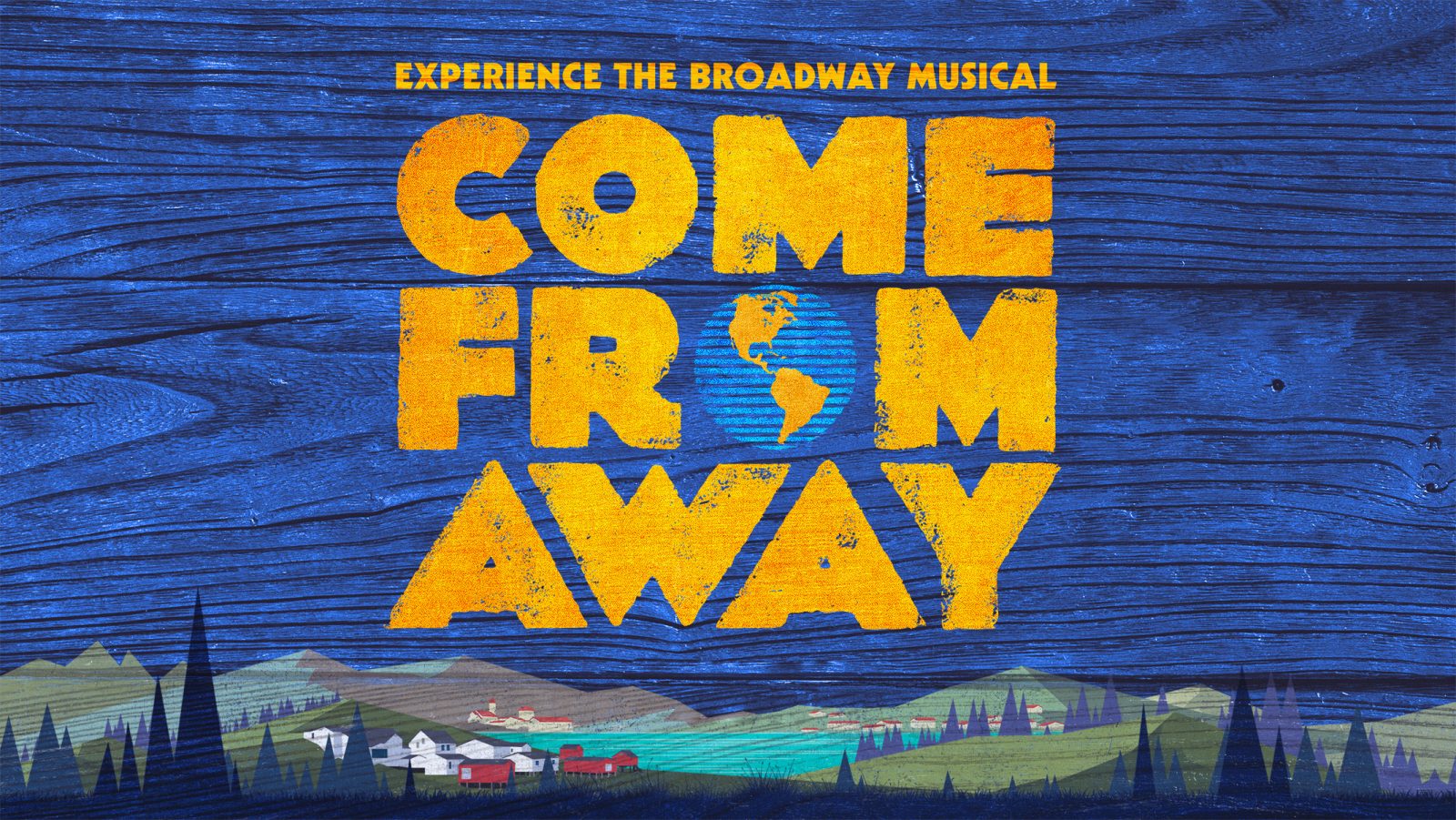From my point of view, these days the world (or at least North America) is changing its master narrative of 9/11 and the War on Terror. More and more stories are being told about those who suffered from US counterattacks, and mounting prejudice against anyone who looked like they might be Muslim or Middle-Eastern.
The focus of the events of September 11, 2001 is diminishing as it becomes clear that those are not what has had the most direct impact on so many lives today. This is why I find it so interesting that the fairly recent 2017 Tony Award winning musical Come From Away is, at its core, a 9/11 story being told 16 years later.

Come From Away is, in its own way, a new narrative. It is a rarely-told Canadian story of something adjacent to the terrorist attacks themselves—38 planes that landed in Gander, Newfoundland, when the US airspace was closed. There were as many “plane people” as there were Gander residents, and they were welcomed with open arms by the community. It asks a different question than usual about 9/11: what was it like to be on a plane that landed safely that day? But then again, is it so different when many people’s go-to when the subject is discussed is indeed, Where was I that day?
The show does bring up more of the contemporary focuses such as Islamophobia and racism, and the immediate change in attitude of white people towards Middle-Eastern people. There are scenes where a Muslim man is confronted while praying by a group of white men, who apparently believe he should give up his religion because other people have done bad things because of it. At the end of the show, a Middle Eastern man says, “On the way to my restaurant I drop my daughter at school, but she won’t go in. She says she’s scared. What do I tell her?” These are still current issues, 20 years later. But it is not the focus of the show. If anything, they mostly serve to contrast how kind and accepting the people of Gander were. It is serving to boost a Canadian image, and though the kindness of Gander’s community was real and important, it leaves a sour taste in my mouth that these moments sometimes come off as a means to an end.
Come From Away is a story of community and coming together, showing the light amid such dark times. But I sometimes wonder if it is appropriate. I am of the opinion that all stories should be told, and this is truly a beautifully told one. But the nature of Broadway amplifies it to a huge audience, when once it was a small news story. Is this a story that is important to tell now, after so many years? Three weeks ago, for the twentieth anniversary of 9/11, a professionally-shot video of the musical started streaming on Apple TV. There are so many other important current issues directly stemming from the War on Terror that could use that publicity for awareness. Is this a story that would have felt more appropriate ten years ago? Or would our comfort with it only be due to a more unaware general culture?
sometimes wonder if it is appropriate. I am of the opinion that all stories should be told, and this is truly a beautifully told one. But the nature of Broadway amplifies it to a huge audience, when once it was a small news story. Is this a story that is important to tell now, after so many years? Three weeks ago, for the twentieth anniversary of 9/11, a professionally-shot video of the musical started streaming on Apple TV. There are so many other important current issues directly stemming from the War on Terror that could use that publicity for awareness. Is this a story that would have felt more appropriate ten years ago? Or would our comfort with it only be due to a more unaware general culture?
Asking these questions makes me uncomfortable. Come From Away is one of my favourite musicals, and I was lucky enough to see it on Broadway in 2018. The music and lyrics, the characters and individual stories, are all both heart-warming and heart-wrenching. It is a beautiful piece of art. It makes me proud of my country and gives me hope and faith in humanity. As someone born in 2003, it gives me insight into the experience of that day and the following week, which is fascinating. This once-unanimous cultural experience is fading, but through this musical I get to experience it. However, maybe we should be letting it fade away, not digging it up over and over again. There are other stories, such as those of refugees, I could be learning instead. To me, Come From Away is an amazing story of its type. But maybe it’s best if it could be the last story of its type. It did great things to bring awareness to a different side of a famous event. What society and literature need right now is to take a step back and look at all the stories surrounding such events and examine how they play out alongside them. Even this beloved musical telling a “new” story in a surprising medium may not be doing enough.
In the end, Come From Away is a majority white story. It’s a true one. But when I think of who has lived through the most fallout after 9/11, the majority are not white people. It’s the millions of refugees, and the Muslims in the West having their religion attacked. Those are the stories I want to seek out in the future, and I hope everyone else who has heard countless 9/11 stories seeks them out too.
I love this idea! I love Come From Away, and it does tend to leave you with a warm and fuzzy feeling after seeing a community come together. Unfortunately, like you mentioned, it does come hand-in-hand with a very white and West-centric narrative. It is important that all stories surrounding 9/11 get told, but the impacts and aftereffects of 9/11 have long been drowned out by our North American media. Great take!
Never heard of Come From Away before, but seeing you critique it’s existence was an interesting read. I agree that way too much of the 9/11 discourse is from a western perspective, and also want to see more works from the perspective of middles easterners impacted by the War on Terror. In your post, you mentioned seeing refugee perspectives, but I think the story that is told even less is that of the soldiers defending their countries from American imperialism. In western media (including Redeployment, funnily enough) These soldiers are referred to as insurgents or terrorists and are simply targets for Americans to shoot. What’s their story? I’ve literally never heard a word either written or spoken from one of their perspectives. I think that’s because the West still considers them the “bad guys” because they actually fought back against the US, while refugees are a lot easier to portray as good because they haven’t killed Americans. Where’s their Broadway musical?
WOW! Loved your post – and the ideas you brought up. I’ve never seen the musical Come From Away, but after reading your post I feel like I can see clearly the ideas you’re presenting. I find the topic really interesting, asking questions like “is this really the story we need to be telling TODAY, in 2021?” And it leaves a lot more questions, The tragedy of 9/11 is one that can not and should not be denied, but the fallout that it has left on everyone effected – not JUST the white, american, perspective that we so often see, is a story in and of itself, and one we don’t hear nearly enough. I would even like to ask this question about Redeployment, and yes it is a tragic story about an american veteran, but is that really the perspective we should be exclusively focusing on? The trauma veterans face is a story we have heard a lot of, and paying respects and sympathizing with their pain is something I at least have been taught extensively. But what about the other perspectives? The citizens, the insurgents, the OTHER PEOPLE. I feel as if we don’t hear enough of it. Interestingly, in sociology, as I’m sure you remember, the very first reading we were assigned was a Ted-Talk about empathy, specifically empathy for iraqi insurgents. It allowed me as a viewer to take a much wider perspective and gain a much better understanding for the concept of “empathy.” I think it would be really interesting if we used this concept more in Astu, especially in regards to the war on terror. I would love to focus on different stories and more perspectives, hopefully we do ! Loved your topic and ideas, thank you so much !
Here is the ted talk link for anyone who would like to check it out!
https://www.ted.com/talks/sam_richards_a_radical_experiment_in_empathy/transcript?language=en
Ooh, thanks for bringing this in, Zoe. I love seeing the connection to work you are doing in Sociology!